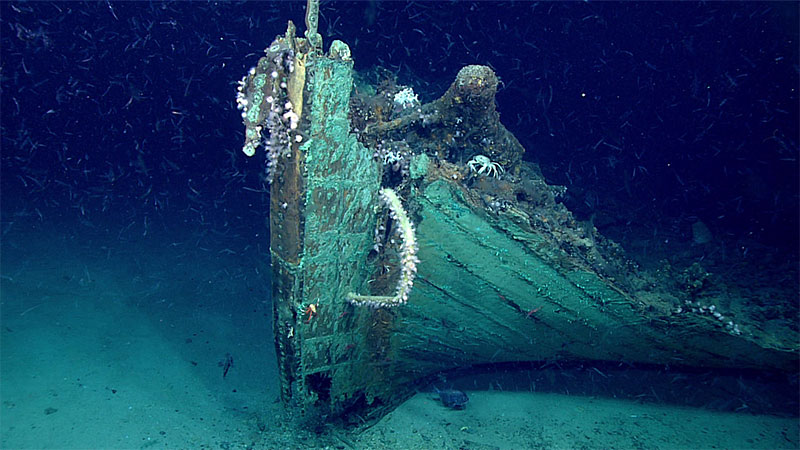Why do we study shipwrecks?
Studying shipwrecks can help us understand the past, connect us to our cultural heritage, and teach us lessons on how the environment and human error can impact each other.

A close-up view of the bow of a shipwreck discovered in the Gulf of America during a 2019 shakedown cruise on NOAA Ship Okeanos Explorer. Marine life is prevalent on the wreck, except on the copper sheathing which still retains its antifouling ability to keep the hull free of marine organisms that would otherwise burrow into the wood and consume the hull or barnacles that would reduce the vessel’s speed. Image courtesy of the NOAA Office of Ocean Exploration and Research. Download image (jpg, 100 KB).
Archaeology, simply defined, is the science of learning about past human behavior by examining the physical remains left behind by people of the past. Archaeological remains–including sites, structures, features, and artifacts–provide tangible links to our collective human history and are glimpses into the social, economic, and cultural evolution of our species. Archaeology–at its core–is about discovery. We discover how people in the past lived, how they adapted to their environment, how they utilized natural resources, and how they changed the world around them.
Unlike elaborately contrived sites such as graves and temples, shipwrecks are accidental and therefore show the past as it really was. Additionally, unlike sites on land, many ships sink to the bottom where they are often left alone until discovered. Shipwrecks thus are like time capsules, preserving a single moment in time, and by studying them, archaeologists can can begin to understand the past.
While archaeological research has taught us much about how ships have influenced the course of human history, scientists are also beginning to learn how sunken ships influence ecology in the deepwater marine environment—from the transfer of organisms from one body of water to another as the ship was transitting to serving as places where marine life can colonize once a wreck has come to rest on the seafloor. The study of wrecks can also teach us important lessons about how currents, weather, technology, and human error can impact the environment.